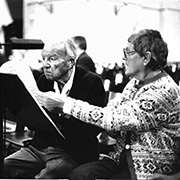“Krenek has an insatiable musical curiosity and, with regard to exterior influences, he is perfectly capable of adopting the attitude: ‘I have to try everything once’ ... His work tends to be lyrical, elegiac and euphonic: qualities that characterize this uniquely generous, self-possessed, peaceable personality. He is truly the opposite of an ‘artist as egotist’.” No lesser than Glenn Gould formulated this wonderful homage. Although his name is widely known, Ernst Krenek is one of those classics of the 20th century whose oeuvre still contains much to be discovered. Gladys Krenek, his wife and faithful companion, died on 5 July 2016 in Palm Springs, a few days after she had answered these questions.
[t]akte: The photo shows you with Ernst Krenek in 1988 in Salzburg at the rehearsals for the world premiere of his oratorio Symeon der Stylit. This looks like a very involved artistic dialogue on Krenek’s music. Was his music, his composing, his aesthetic, one of your most important topics of discussion?
Gladys Krenek: He didn’t ask me what I thought of his latest works. So I wasn’t a critical sounding-board for him. But we discussed his musical ideas in relation to expressionism. For my part, I always felt that what he wrote was without doubt magnificent.
In 2004, with the support of the Republic of Austria, you inaugurated the Ernst Krenek Private Foundation in Krems, providing it with numerous documents, manuscripts, letters, etc. Was this important and exemplary initiative something which Ernst Krenek wanted, or was the whole thing your idea?
A couple of years after his death, it became clear to me that all his original manuscripts and his works in general should go to Austria. And so I seized the initiative which led to the inauguration of the Foundation.
How do you judge the current assessment of Ernst Krenek’s exceptionally versatile output as a composer and writer?
Thanks to some excellent CDs which are frequently played on the radio, Krenek’s music has become known worldwide. Besides that, his chamber music and the songs are becoming better known, but with the orchestral works there is still a lot to discover. It is very gratifying how his increasing profile is reflected in symposia with concerts at universities. He is also becoming better known as a literary figure.
The posthumous publication of his extensive autobiography, written in English, has contributed to this. This was published in a German translation in 1998, and this year an English edition will be released. Let’s imagine that we could still interview Ernst Krenek and that we can grant him one wish. What might his answer be?
I think he would want his works to be performed so well that they would have a chance of being received as he intended and being correctly understood!
And if you had a wish, what would it be?
I would wish that his operas, which form the main part of his output, were discovered! Great operas such as Chrysomallos, Orpheus und Eurydike, Pallas Athene weint, Leben des Orest, Der Sprung über den Schatten.
Interview by Michael Töpel
(from [t]akte 2/2016)



